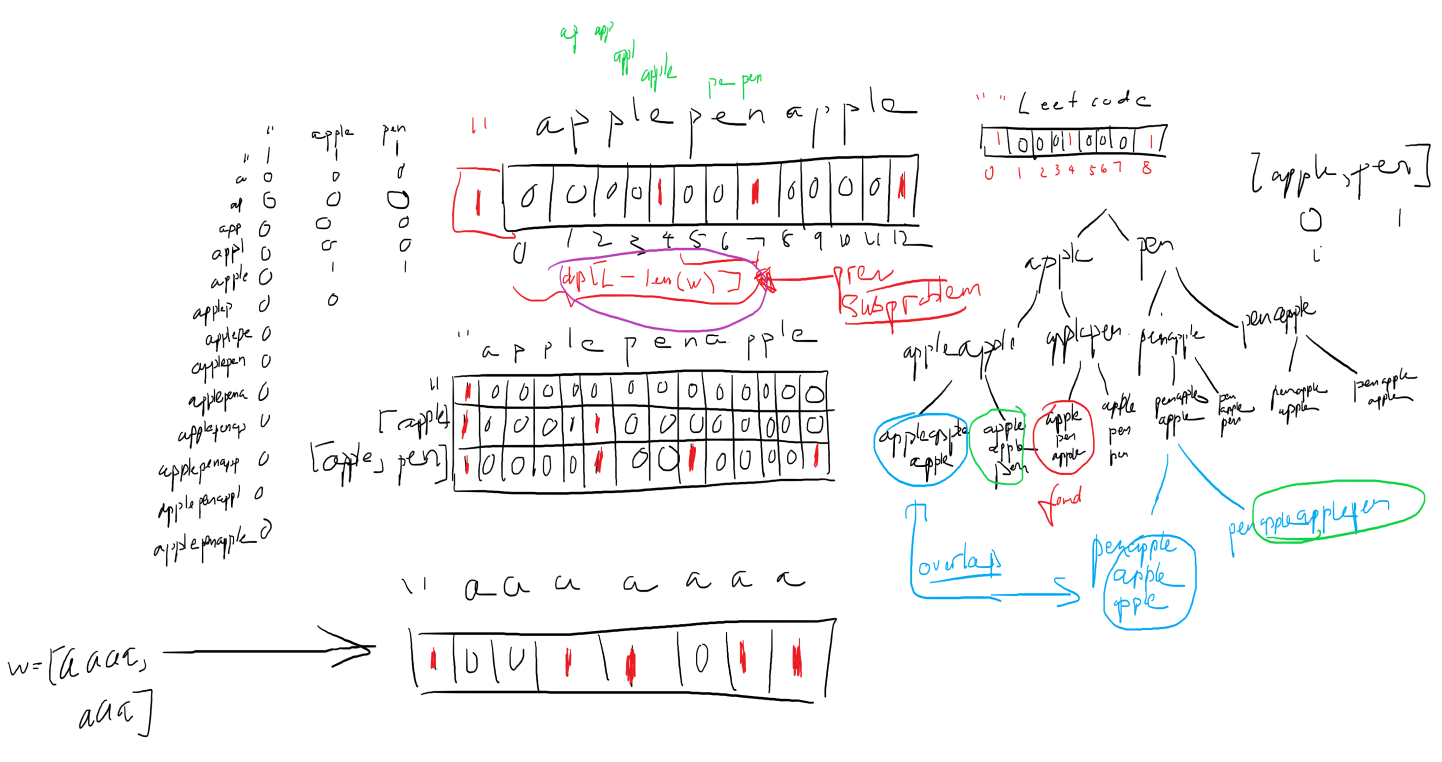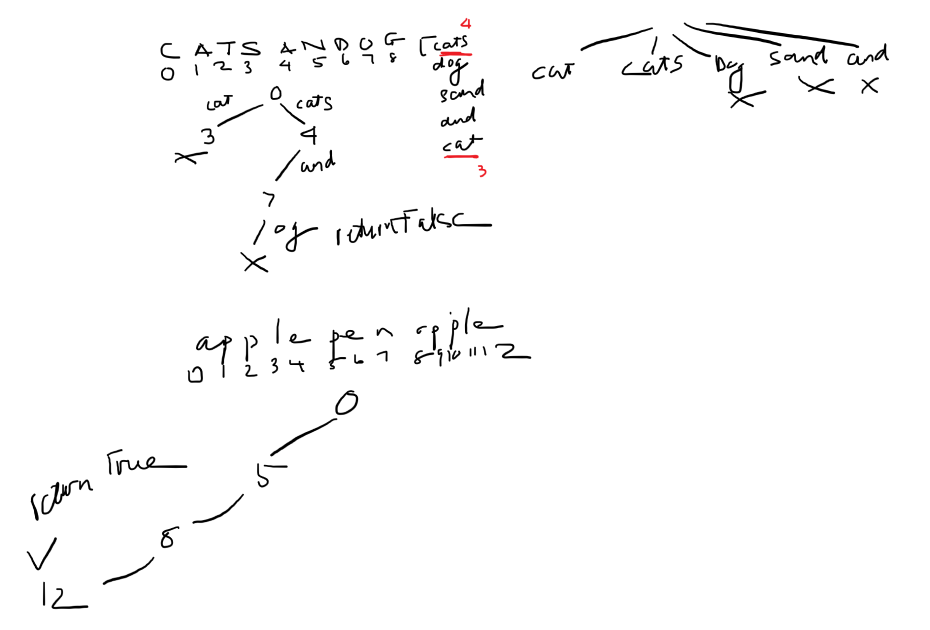Problem of The Day: Word Break
Problem Statement
Given a string s and a dictionary of strings wordDict, return true if s can be segmented into a space-separated sequence of one or more dictionary words.
Note that the same word in the dictionary may be reused multiple times in the segmentation.
Example 1:
Input: s = "leetcode", wordDict = ["leet","code"]
Output: true
Explanation: Return true because "leetcode" can be segmented as "leet code".
Example 2:
Input: s = "applepenapple", wordDict = ["apple","pen"]
Output: true
Explanation: Return true because "applepenapple" can be segmented as "apple pen apple".
Note that you are allowed to reuse a dictionary word.
Example 3:
Input: s = "catsandog", wordDict = ["cats","dog","sand","and","cat"]
Output: false
Constraints:
1 <= s.length <= 300
1 <= wordDict.length <= 1000
1 <= wordDict[i].length <= 20
s and wordDict[i] consist of only lowercase English letters.
All the strings of wordDict are unique.
Brute Force - Time Limit Exceeded
Intuition
My initial thoughts on solving this problem involve exploring all possible combinations of words from the wordDict to break down the input string.
Approach
I have implemented a depth-first search (DFS) approach, where I recursively try different word combinations to see if they can form the original string. The function uses a base case to check if the current string matches the input string, and it explores all possibilities by appending words from the wordDict.
Complexity
-
Time complexity: O(n ^ m) N is the length of the input string, and M is the maximum length of a word in the wordDict. In the worst case, the algorithm explores all possible combinations of words, resulting in exponential time complexity.
-
Space complexity: O(n) The space complexity is determined by the depth of the recursion stack, which is proportional to the length of the input string. However, the algorithm does not use additional space structures like lists or dictionaries.
Code
class Solution:
def wordBreak(self, s: str, wordDict: List[str]) -> bool:
def dfs(curr_str):
if len(curr_str) >= len(s):
if curr_str == s:
return True
return False
res = False
for word in wordDict:
if dfs(curr_str + word):
res = True
break
return res
return dfs("")
While the logic appears correct, there’s a potential issue with the current implementation. It doesn’t handle cases where a word from the wordDict can be used multiple times. In other words, it may miss valid combinations if the same word needs to be repeated to form the input string.
Dynamic Programming
In order to avoid redundant calculation from the brute force approach, I applied the dynamic programming to improve time and space complexity.
Intuition
The initial intuition to solve this problem involves dynamic programming to keep track of valid break points in the input string. The goal is to determine whether the given string can be broken into words from the provided wordDict.
Approach
The approach utilizes dynamic programming with a boolean array dp, where dp[i] indicates whether the substring s[:i] can be broken into words from the wordDict. The algorithm iterates through each position in the string and checks if any valid word combinations lead to the current position. The presence of a valid break point is stored in the dp array.
Complexity
-
Time complexity: O(n^2). The algorithm iterates through each position in the input string and performs a nested loop to check for valid word combinations. The inner loop has a maximum length of
NwhereNis the length of the input string. -
Space complexity: O(n). The algorithm uses a boolean array dp of size N+1 to store whether each substring can be broken into words. Additionally, other variables used have constant space complexity.
Code
class Solution:
def wordBreak(self, s: str, wordDict: List[str]) -> bool:
N = len(s)
dp = [False] * (N + 1)
dp[0] = True # An empty string is always breakable, so dp[0] is True
start = 0
# Iterate through each position in the string
for i in range(1, N + 1):
j = i - 1
# Check all possible substrings ending at position i
while j >= 0:
curr = s[j:i]
# If the current substring is in wordDict and the prefix (before the current substring) is breakable
if curr in wordDict and dp[i - len(curr)]:
dp[i] = True # Mark the current position as breakable
break
j -= 1 # Move to the next smaller substring
return dp[-1] # The last element of dp indicates whether the entire string is breakable
Editorial Solution
Breadth-First Search (BFS)
class Solution:
def wordBreak(self, s: str, wordDict: List[str]) -> bool:
words = set(wordDict)
queue = deque([0])
seen = set()
while queue:
start = queue.popleft()
if start == len(s):
return True
for end in range(start + 1, len(s) + 1):
if end in seen:
continue
if s[start:end] in words:
queue.append(end)
seen.add(end)
return False
Top Down - DFS
The trick is to use @cache for memoization
class Solution:
def wordBreak(self, s: str, wordDict: List[str]) -> bool:
@cache
def dp(i):
if i < 0:
return True
for word in wordDict:
if s[i - len(word) + 1:i + 1] == word and dp(i - len(word)):
return True
return False
return dp(len(s) - 1)
Dynamic Programming
class Solution:
def wordBreak(self, s: str, wordDict: List[str]) -> bool:
dp = [False] * len(s)
for i in range(len(s)):
for word in wordDict:
# Handle out of bounds case
if i < len(word) - 1:
continue
if i == len(word) - 1 or dp[i - len(word)]:
if s[i - len(word) + 1:i + 1] == word:
dp[i] = True
break
return dp[-1]
Trie Approach
class TrieNode:
def __init__(self):
self.is_word = False
self.children = {}
class Solution:
def wordBreak(self, s: str, wordDict: List[str]) -> bool:
root = TrieNode()
for word in wordDict:
curr = root
for c in word:
if c not in curr.children:
curr.children[c] = TrieNode()
curr = curr.children[c]
curr.is_word = True
dp = [False] * len(s)
for i in range(len(s)):
if i == 0 or dp[i - 1]:
curr = root
for j in range(i, len(s)):
c = s[j]
if c not in curr.children:
# No words exist
break
curr = curr.children[c]
if curr.is_word:
dp[j] = True
return dp[-1]

